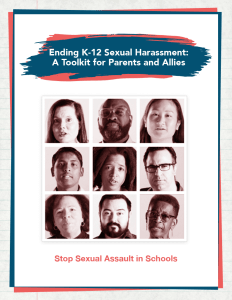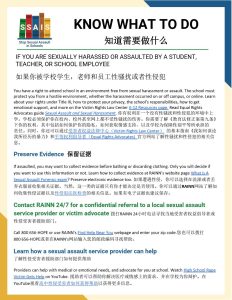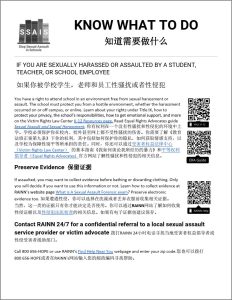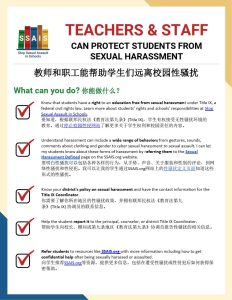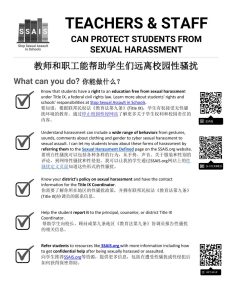A subject we must discuss with students
这是一个我们必须和学生讨论的主题
 by Xinyi He and SSAIS
何心怡和SSAIS
by Xinyi He and SSAIS
何心怡和SSAIS
Many Asian students rarely talk about sex at home or in school. It’s not that students don’t want to talk about it, it’s that parents almost never talk about this taboo topic with their children. Many parents also approach sexual assault cases as the victim’s problem rather than the perpetrator’s responsibility. This is because most Asian countries continue to be influenced by Confucian and Taoist philosophies that emphasize procreation and sexuality in the context of the social order. Premarital sex is against traditional cultural norms. But as times are rapidly changing, more and more Asian parents are talking about sex, and even some Asian countries put sex education in their compulsory courses in primary and middle schools.
许多亚裔学生在家或者在学校鲜少谈论性. 不是因为学生们不愿谈论这个话题,而是家长们从不和他们的子女谈论这个禁忌话题。许多家长还面对性侵受害者时认为这是性侵受害者的问题,还不是施暴者的责任。这是因为大多数的亚洲国家受到儒家和道家哲学的影响,这些哲学强调升值和性的社会秩序方面。婚前性行为是违反传统文化。但是随着时代的快速发展,越来越多的亚洲父母开始谈论性,许多亚洲国家也将性教育纳入中小学的必修课程。
Starting the conversation 开始对话
Students in K-12 schools need parents, family members, and adult friends to start the conversation about a very serious and widespread problem: sexual harassment and assault in K-12 schools. At least half of K-12 students will experience the negative impact of sexual harassment or assault either by peers or school staff, starting as early as kindergarten. But most students will never report it. Instead they suffer in silence, become depressed or anxious, fail to fully succeed in their studies, may drop out, and some will harm themselves. To start the conversation, adults must learn about the many types of sexual harassment and the warning signs when students have experienced it. You’ll find this information on the Stop Sexual Assault in Schools (SSAIS) webpage called Sexual Harassment Defined.
幼儿园到高中的学生需要父母、家庭成员和成年朋友尽早开始讨论一个非常严重和普遍的问题:学校的性骚扰和性侵犯。从幼儿园开始,至少有一半的学生会遭遇来自同龄人或学校工作人员的性骚扰或性侵犯,并对学生产生负面影响。但大多数学生永远不会和老师或者家长讲述自己的遭遇。相反,他们会默默忍受,从而变得沮丧或焦虑,无法专心在在学习上,最终可能会导致辍学,有些人甚至会伤害自己。为了和学生更好的讨论这个话题,家长们必须了解许多类型的性骚扰,以及学生经历过性骚扰后的警告信号。你可以在 Stop Sexual Assault in Schools (SSAIS) 名为“定义性骚扰”的网页上找到这些信息。
Examples of sexual harassment 性骚扰案例
For example, sexual harassment can include disturbing remarks about not looking or acting like a stereotypical girl or boy. It can include sexual gestures, sounds, sexual jokes, unwanted sexual messages, pictures, or videos, insults and threats from a dating partner, a romantic relationship between a student and adult (even if the student wants it), unwanted touch, sexual groping, and rape. It happens to girls, boys, and gender non-conforming students (LGBTQ). It can happen in the classroom, online, on the playground, in the bathroom, in the locker room, on the school bus, at a teacher’s house, or on a date. Watch these parents talk about their students being sexually harassed.
例如,性骚扰包括令人不安的言论,不像一个正常的女孩或男孩的言谈举止或行为。它可以包括性手势、声音、性笑话、不想要的性信息、图片或视频、约会对象的侮辱和威胁、学生和成年人之间的恋爱关系(即使学生想要)、不想要的触摸、性抚摸和强奸。这种情况发生在女孩、男孩和性少数群体的学生(LGBTQ)身上。性骚扰可以发生在教室里,网上,操场上,浴室里,更衣室里,校车上,老师家里,或者在约会时。看看这些父母谈论他们的学生被性骚扰。
Public and private school responsibilities 公立和私立学校的责任
Students in both public and private schools are sexually harassed and assaulted. Whether it happens at school or off school property, students need help with the trauma caused and the impact on their education. When sexual harassment or assault creates a hostile environment at school or online, the school must take effective steps to stop the harassment and protect the student. Beware! Schools will try to cover up the harassment to protect their reputation. Visit the SSAIS website to learn how to take action to protect students.
公立和私立学校的学生都遭到性骚扰和性侵犯。无论是发生在学校还是校外,学生们都需要帮助来解决创伤和对他们教育的影响。当性骚扰或性侵犯对学校或上网环境造成破坏时,学校必须采取有效措施制止性骚扰,保护学生。但是!部分学校也会试图掩盖性骚扰,以保护自己的声誉。请访问SSAIS网站,了解如何采取措施保护学生。
Talking to students 与学生交谈
Talk with your student about the types of sexual harassment and how sexual harassment is prohibited at school or online just like it is in the workplace. Help your student recognize sexual exploitation, grooming, and abuse by teachers or school staff. Encourage students to stand up to harassment and discrimination, whether against themselves or others. Reach out to students who are uncomfortable talking with their families. Help them find support. Use the SSAIS fact sheet Know What to Do.
家长们需要和自己的孩子谈论性骚扰的类型,以及如何在学校或者网络上避免性骚扰的发生,就像在工作场所一样。你帮助你的学生认识到老师或学校工作人员的性剥削、性诱拐和性侵犯。鼓励学生勇敢地面对骚扰和歧视,无论是针对自己还是他人。接触那些不愿与家人交谈的学生。帮助他们找到情感支持。可以通过SSAIS网站的情况说明书了解具体做法。
Sexual harassment, assault are community problems 性骚扰和性侵是社区问题
These aren’t just other families’ problems. The perpetrator of the sexual harassment or assault may be a student or school employee who has frequent contact with your student. Your student may have witnessed or heard about sexual harassment or assault and may feel uncomfortable or unsafe at school. If a school discounts or dismisses reports of sexual harassment or assault, your student may be discouraged from reporting, or may even be a victim of sexual harassment but not told anyone. Sexual harassment and assault are community problems that impact all students.
这不仅仅是其他家庭的问题。骚扰或性侵犯的肇事者可能是经常与你的学生接触的学生或学校员工。你的学生可能亲眼目睹或听说过性骚扰或性侵犯,在学校可能会感到不舒服或不安全。如果学校对性骚扰或性侵犯的现象漠不关心或置之不理,学生可能对向学校处理性骚扰失去信心,甚至可能学生本身成为性骚扰的受害者。骚扰和性侵犯是影响所有学生的社会问题。
Taking action 采取行动
That’s why adults must take action. In addition to learning about this problem and talking with students, read your school’s anti-discrimination and anti-harassment policies. They must be available online or from your school’s office. They should define sexual harassment and explain what actions the school takes when it learns of sexual harassment or discrimination. Find out what the school is doing to prevent sexual harassment. All public schools and any private schools that receives even one dollar of federal money must follow a civil rights law called Title IX. Title IX guarantees students the right to an education free from sex discrimination and sexual harassment. Learn about students’ Title IX rights on the SSAIS website.
这就是为什么成年人必须采取行动。除了了解这个问题,与学生交谈,阅读学校的反歧视和反骚扰政策。这些政策一定能在网上或学校办公室找到。同时,他们应该定义性骚扰,并了解学校在得知性骚扰或歧视后应该采取的行动。了解学校为防止性骚扰正在做什么。所有的公立学校和任何接受联邦政府微小资助的私立学校都必须遵守一项名为《教育法修正案第九条》的民权法。《教育法修正案第九条》保障学生获得不受性别歧视和性骚扰的教育权利。你可以在SSAIS官方网站了解《教育法修正案第九条》的具体内容。
Title IX Coordinators 美国教育修正案第九条协调员
Make sure your school district has a trained Title IX coordinator. The Title IX coordinator’s contact information must be publicly available and easy to find. Learn more about the essential role of the Title IX Coordinator on the SSAIS Title IX Coordinator’s webpage. Learn how to investigate what a school does about sexual harassment and assault using this guide.
确保你的学区有一个训练有素的《第九条》协调员。《第九条》协调员的联系信息必须是公开且容易找到的。在SSAIS《第九条》协调员的网页上了解更多关于第九条协调员的重要作用。通过《如何收集学区<第九条>相关政策》指南来了解学校是否对性骚扰作出相应的对策。
Continue the conversation 继续对话
Bottom line, sexual harassment and assault are a reality in K-12 schools. We can’t ignore it any longer. Students’ lives can be devastated by the sexual harassment or assault and by the school’s inadequate response. It doesn’t have to be this way. If we all take action, we can protect our students and make our schools safe places to learn for everyone. We can prevent the far-reaching, long-lasting effects of sexual harassment and assault. Start the conversation, continue the conversation, and use the parent toolkit and resources on the SSAIS website to help students and parents better deal with sexual harassment and assault.
总之,性骚扰和性侵犯是目前美国学校需要面对的现实。我们不能再忽视它了。如果学校应对不力,学生的生活可能会被性侵犯或性骚扰所破坏。但是我们可以选择不让学生遭此灾难。如果我们都采取行动,我们就能保护我们的学生,使我们的学校成为每个人都能安全学习的地方。我们可以防止性骚扰和性侵犯所带来深远和持久的影响。让我们从现在开始和学生对话,并使用SSAIS网站上的家长工具包和资源帮助学生和家长更好的应对性侵犯和性骚扰。
Intersectionality and Students of Color 交叉性和有色人种的学生
The Silent Struggle: Intersectionality and Students of Color
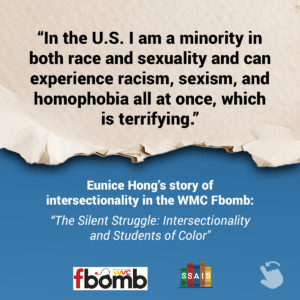 Written and translated by Eunice Hong
Written and translated by Eunice Hong
Originally appeared in FBomb.
Read in traditional Chinese 閱讀繁體中文版
Read in simplified Chinese 阅读简体中文版
The term “intersectionality” was coined by Kimberlé Crenshaw and acknowledges that individuals hold multiple identities — such as race, gender, and ethnicity — that intersect to shape their experiences. Stereotypes, cultural insensitivity, and historical prejudices contribute to environments where these individuals may be more vulnerable to various forms of harassment, especially sexual harassment.
But intersectionality is more than a concept; it has informed my life as an Asian woman who is also a member of the LGBTQ community. In my home country, where I am a member of the majority culture, I haven’t experienced racism, but in the U.S. I am a minority in both race and sexuality and can experience racism, sexism, and homophobia all at once, which is terrifying.
As a member of more than one oppressed group, I also experience greater vulnerability regarding sexual harassment. Sexual harassment is a pervasive issue not only in K-12 schools and on college campuses but also in the culture at large, and is particularly shaped by racial stereotypes. For example, in many American movies, Asian women are portrayed as sexually submissive and lacking independent thoughts of their own. We are seen as submissive and vulnerable in the eyes of men, thereby emboldening perpetrators to sexually harass us.
Asian LGBTQ students, like myself, face the added challenge of navigating cultural stigma in the Asian community, where discussing sex in any capacity is discouraged. In Xinye He’s article “A Subject We Must Discuss” on the Stop Sexual Assault in Schools website, she writes, “Many Asian students rarely talk about sex at home or in school,” not because they don’t want to, but because “parents almost never talk about this taboo topic with their children.” What’s more, He adds, “many parents also approach sexual assault cases as the victim’s problem rather than the perpetrator’s responsibility.”
Reporting sexual harassment is also a complicated matter for many women of color. Not only do these institutions lack awareness of our intersectional struggle, but the justice system is also complicated for those of us with foreign-student status. We worry that reporting or getting involved in a harassment report could affect our immigration or visa status and possibly lead to deportation. Many perpetrators of sexual violence target international students because they can take advantage of our fear and silence us.
Bringing awareness to middle and high school students about intersectionality is critically important. “Sexual Harassment and Students of Color” is an important resource at the SASH Club project (Students Against Sexual Harassment). It explains how students of color are uniquely impacted by harassment, including the barriers we face to reporting. It also outlines how schools can better prevent and respond to sexual harassment of students of color and how police-free schools can improve outcomes for students of color.
Middle and high school students can also understand intersectionality through a pervasive problem impacting their lives: school dress codes. “Can Dress Codes Harm Students?” shows how girls, LGBTQ students, and students of color are most affected. Part 2, “How to Reform or Abolish School Dress Codes” offers steps to make change. The resources on the SASH Club website help students build awareness and safer communities within educational institutions so they are informed, supported, and spared experiences like mine.
無聲的鬥爭:交叉性和有色人種的學生
透過 Eunice Hong
「交叉性」一詞由 Kimberlé Crenshaw 創造,它承認個體擁有多種身份,例如種族、性別和民族,這些身份交叉形成了他們的經歷。刻板印象、文化麻木不仁和歷史偏見導致這些人更容易受到各種形式的騷擾,尤其是性騷擾。
但交叉性不僅僅是一個概念;它還影響著我作為亞洲女性和 LGBTQ 群體成員的生活。在我的國家,我是主流文化中的一員,我沒有經歷過種族主義,但在美國,我在種族和性取向上都是非主流,這也表示我有機會同時經歷種族主義、性別歧視和恐同症。
身為不只一個受壓迫群體的成員,我在性騷擾問題上也更容易受到傷害。性騷擾是一個普遍存在的問題,性騷擾不僅在幼兒園到十二年級的學校和大學校園中普遍存在,在整個文化中也是如此,尤其受到種族刻板印象的影響。在許多美國電影中,亞洲女性被描繪成在性方面順從且缺乏自己獨立思想的人。在男人眼中,我們被視為順從和脆弱,從而使犯罪者有恃無恐地對我們進行性騷擾。
像我一樣的亞洲 LGBTQ 學生面臨著克服亞洲社區文化恥辱的額外挑戰,在亞洲社區,任何身份討論性都是不被鼓勵的。何心怡在SSAIS(停止學校性侵犯) 網站上發表的文章”我們必須討論的一個話題”中寫道,“許多亞洲學生很少在家裡或學校談論性,不是因為他們不想,而是因為父母幾乎從不和孩子談論這個禁忌話題。” 更重要的是 “許多家長也將性侵犯案件視為受害者的問題,而不是施暴者的責任。”
對許多有色人種女性來說,舉報性騷擾也是一件複雜的事。大多數的美國機構不僅缺乏對我們交叉鬥爭的認識,而且司法系統對我們這些擁有外國學生身份的人來說也很複雜。我們擔心舉報或參與騷擾舉報可能會影響我們的移民或簽證身份,並可能導致被驅逐出境。許多性暴力的施暴者都以國際學生為目標,因為他們可以利用我們的恐懼並讓我們保持沉默。
我認為提高中學生對交叉性的認識至關重要。「性騷擾與有色人種學生」是 SASH Club(學生反對性騷擾)的重要資源。它解釋了有色人種學生如何受到騷擾的獨特影響,包括我們在舉報方面面臨的障礙。它還概述了學校如何更好地預防和應對有色人種學生的性騷擾以及沒有警察的學校如何改善有色人種學生的學校生活。
中學生和高中生也可以透過影響他們生活的普遍問題來理解交叉性,例如學校服裝規範。在文章 “著裝規範會傷害學生嗎?” 中,女孩、LGBTQ 學生和有色人種學生受到的影響最大。而在第 2 部分「如何改革或廢除學校服裝規範」提供了改善現狀的建議。 SASH Club 網站上的資源有助於學生在教育機構內建立意識和更安全的社區,以便他們獲得資訊、支持並避免像我一樣的經驗。
无声的斗争:交叉性和有色人种的学生
通过 Eunice Hong
「交叉性」一词由 Kimberlé Crenshaw 创造,它承认个体拥有多种身份,例如种族、性别和民族,这些身份交叉形成了他们的经历。 刻板印象、文化麻木不仁和历史偏见导致这些人更容易受到各种形式的骚扰,尤其是性骚扰。
但交叉性不仅仅是一个概念;它还影响着我作为亚洲女性和 LGBTQ 群体成员的生活。 在我的国家,我是主流文化中的一员,我没有经历过种族主义,但在美国,我在种族和性取向上都是非主流,这也表示我有机会同时经历种族主义、性别歧视和恐同症。
身为不只一个受压迫群体的成员,我在性骚扰问题上也更容易受到伤害。 性骚扰是一个普遍存在的问题,性骚扰不仅在幼儿园到十二年级的学校和大学校园中普遍存在,在整个文化中也是如此,尤其受到种族刻板印象的影响。 在许多美国电影中,亚洲女性被描绘成在性方面顺从且缺乏自己独立思想的人。 在男人眼中,我们被视为顺从和脆弱,从而使犯罪者有恃无恐地对我们进行性骚扰。
像我一样的亚洲 LGBTQ 学生面临着克服亚洲社区文化耻辱的额外挑战,在亚洲社区,任何身份讨论性都是不被鼓励的。 何心怡在SSAIS(停止学校性侵犯) 网站上发表的文章“我们必须讨论的一个话题”中写道,“许多亚洲学生很少在家里或学校谈论性,不是因为他们不想,而是因为父母几乎从不和孩子谈论这个禁忌话题。 “ 更重要的是 ”许多家长也将性侵犯案件视为受害者的问题,而不是施暴者的责任。 ”
对许多有色人种女性来说,举报性骚扰也是一件复杂的事。 大多数的美国机构不仅缺乏对我们交叉斗争的认识,而且司法系统对我们这些拥有外国学生身份的人来说也很复杂。 我们担心举报或参与骚扰举报可能会影响我们的移民或签证身份,并可能导致被驱逐出境。 许多性暴力的施暴者都以国际学生为目标,因为他们可以利用我们的恐惧并让我们保持沉默。
我认为提高中学生对交叉性的认识至关重要。 「性骚扰与有色人种学生」是 SASH Club(学生反对性骚扰)的重要资源。 它解释了有色人种学生如何受到骚扰的独特影响,包括我们在举报方面面临的障碍。 它还概述了学校如何更好地预防和应对有色人种学生的性骚扰以及没有警察的学校如何改善有色人种学生的学校生活。
中学生和高中生也可以通过影响他们生活的普遍问题来理解交叉性,例如学校服装规范。 在文章 “着装规范会伤害学生吗?” 中,女孩、LGBTQ 学生和有色人种学生受到的影响最大。 而在第 2 部分「如何改革或废除学校服装规范」提供了改善现状的建议。 SASH Club 网站上的资源有助于学生在教育机构内建立意识和更安全的社区,以便他们获得信息、支持并避免像我一样的经验。

Listen to these parents, relatives, and neighbors describe the toll sexual harassment takes on the K-12 students in their lives. Hear their frustration with schools that discount, disbelieve, and ultimately fail these students, compromising their education and burdening families. They feel that schools aren’t doing enough to protect their loved ones and neighbors.
听听这些家长、亲戚和邻居描述性骚扰对K-12学生生活的影响。他们对学校非常的失望,因为这些学校对学生不重视,不相信受害者学生,甚至让学生变得消极,影响了他们的教育,加重了家庭负担。
Do you know what to do if you are sexually harassed or assaulted? This fact sheet informs you about your rights under Title IX, how to protect your privacy, the school’s responsibilities, how to get emotional support, and more.
如果你受到性骚扰或性侵犯,你知道该怎么做吗?这份说明书告诉你在美国教育修正案第九条下你的权利,如何保护你的隐私,学校的责任,以及受害者学生如何获得情感支持,等等。

